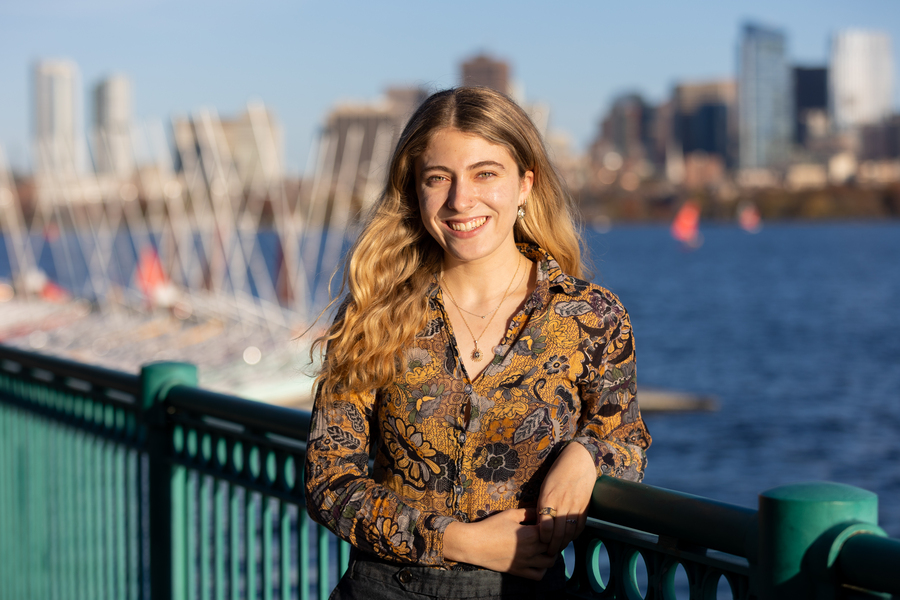PKG Social Impact Intern Aviva Intveld featured in MIT News!
Aviva Intveld (’23) was a PKG Social Impact Intern during IAP 2021 and worked with the World Wildlife Fund (WWF). Aviva shared more about her internship experience on our blog, click here to read more!

Photo: Steph Stevens
Aviva Intveld, an MIT senior majoring in Earth, atmospheric, and planetary sciences, is accustomed to city life. But despite hailing from metropolitan Los Angeles, she has always maintained a love for the outdoors.
“Growing up in L.A., you just have a wealth of resources when it comes to beautiful environments,” she says, “but you’re also constantly living connected to the environment.” She developed a profound respect for the natural world and its effects on people, from the earthquakes that shook the ground to the wildfires that displaced inhabitants.
“I liked the lifestyle that environmental science afforded,” Intveld recalls. “I liked the idea that you can make a career out of spending a huge amount of time in the field and exploring different parts of the world.”
From the moment she arrived at MIT, Intveld threw herself into research on and off campus. During her first semester, she joined Terrascope, a program that encourages first-year students to tackle complex, real-world problems. Intveld and her cohort developed proposals to make recovery from major storms in Puerto Rico faster, more sustainable, and more equitable.
Intveld also spent a semester studying drought stress in the lab of Assistant Professor David Des Marais, worked as a research assistant at a mineral sciences research lab back in L.A., and interned at the World Wildlife Fund. Most of her work focused on contemporary issues like food insecurity and climate change. “I was really interested in questions about today,” Intveld says.
Her focus began to shift to the past when she interned as a research assistant at the Marine Geoarchaeology and Micropaleontology Lab at the University of Haifa. For weeks, she would spend eight hours a day hunched over a microscope, using a paintbrush to sort through grains of sand from the coastal town of Caesarea. She was looking for tiny spiral-shaped fossils of foraminifera, an organism that resides in seafloor sediments.
These microfossils can reveal a lot about the environment in which they originated, including extreme weather events. By cataloging diverse species of foraminifera, Intveld was helping to settle a rather niche debate in the field of geoarchaeology: Did tsunamis destroy the harbor of Caesarea during the time of the ancient Romans?
But in addition to figuring out ifand whenthese natural disasters occurred, Intveld was interested in understanding howancient communities prepared for and recovered from them. What methods did they use? Could those same methods be used today?
Intveld’s research at the University of Haifa was part of the Onward Israel program, which offers young Jewish people the chance to participate in internships, academic study, and fellowships in Israel. Intveld describes the experience as a great opportunity to learn about the culture, history, and diversity of the Israeli community. The trip was also an excellent lesson in dealing with challenging situations.
Intveld suffers from claustrophobia, but she overcame her fears to climb through the Bar Kokhba caves, and despite a cat allergy, she grew to adore the many stray cats that roam the streets of Haifa. “Sometimes you can’t let your physical limitations stop you from doing what you love,” she quips.
Over the course of her research, Intveld has often found herself in difficult and even downright dangerous situations, all of which she looks back on with good humor. As part of an internship with the National Oceanic and Atmospheric Administration, she spent three months investigating groundwater in Homer, Alaska. While she was there, she learned to avoid poisonous plants out in the field, got lost bushwhacking, and was twice charged by a moose.
These days, Intveld spends less time in the field and more time thinking about the ancient past. She works in the lab of Associate Professor David McGee, where her undergraduate thesis research focuses on reconstructing the paleoclimate and paleoecology of northeastern Mexico during the Early Holocene. To get an idea of what the Mexican climate looked like thousands of years ago, Intveld analyzes stable isotopes and trace elements in stalagmites taken from Mexican caves. By analyzing the isotopes of carbon and oxygen present in these stalagmites, which were formed over thousands of years from countless droplets of mineral-rich rainwater, Intveld can estimate the amount of rainfall and average temperature in a given time period. Her research is currently funded through the MIT Climate and Sustainability Consortium’s Climate and Sustainability Scholars Program.
Click here to read the full article on MIT News
Tags: PKG Alumni, Social Impact Internships, Social Impact Internships IAP 2021
